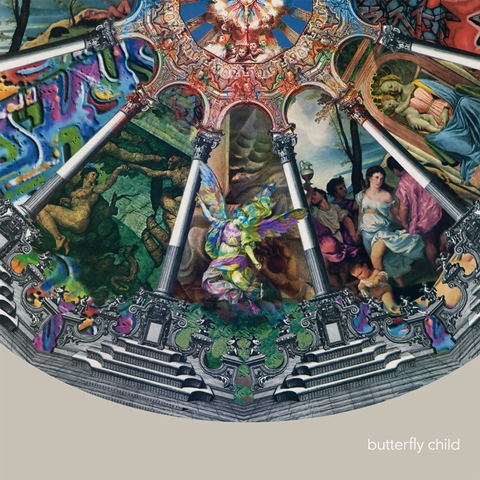Reissue CDs Weekly: Butterfly Child | reviews, news & interviews
Reissue CDs Weekly: Butterfly Child
Reissue CDs Weekly: Butterfly Child
Twenty-five years on, the matchless ‘Onomatopoeia’ still sounds out of time

The critic Simon Reynolds characterised Butterfly Child’s debut album Onomatopoeia as the sound of “vitrified everglades in J.G. Ballard’s The Illuminated Man, where some kind of entropy has slowed down time, so that living creatures are literally petrified, encrusted and crystal.”
Such circumlocution was unsurprising as Onomatopoeia was originally issued by Rough Trade in August 1993 during a between-time moment for independently minded pop. Britpop hadn’t yet taken off, grunge was a clichéd bandwagon and the first flush of shoegazing had run its course. It hit shops around the same time as the label’s new Breeders, Heather Nova and Red House Painters albums. None were comfortable bedfellows. An overarching narrative into which Butterfly Child could slot was hard to find.
 So, “encrusted and crystal” then. NME was as oblique, saying the album was “like trampolining in a conservatory flooded with sunlight.” For a backhanded Melody Maker, Onomatopoeia “severed the umbilical cord between shoegazing’s aural ambition and its implication of cossetted inadequacy.”
So, “encrusted and crystal” then. NME was as oblique, saying the album was “like trampolining in a conservatory flooded with sunlight.” For a backhanded Melody Maker, Onomatopoeia “severed the umbilical cord between shoegazing’s aural ambition and its implication of cossetted inadequacy.”
The reissue of Onomatopoeia makes placing it no easier. It is great – frequently wonderful – but is not about anything which was, indeed, of the moment. Heard now, 25 years on, it sounds fresh, bears some evidence for a fondness for Kitchens of Distinction and New Order. It also, sometimes explicitly, draws from dub and has a haziness which refracts My Bloody Valentine’s between-song amorphousness. Main-main Joe Cassidy’s voice is defeated and distracted.
Butterfly Child were and are the vehicle for Belfast’s Cassidy. After two EPs for A.R. Kane’s label and a Peel session, Onomatopoeia was recorded with Papa Sprain’s Gary McKendry on an 8-track tape recorder and with a drum machine, reverb unit and synthesiser. Home-made and do-it-yourself, it was the unmediated record of how Cassidy saw music. This no-frills reissue comes with grey instead of the original blue as the sleeve’s background colour and lacks liner notes: the latter a pity as it would have been good to learn where Cassidy was coming from, and how he sees the album now.
Over 67 minutes and 12 tracks, industrial noise, slippery bass guitar, cascading and always treated guitar are seamlessly melded and filtered through an ever-present sonic fog. While not as diffuse and overtly shoegazing-influenced as the early Flying Saucer Attack, Onomatopoeia shares some of their tendency towards ensuring finding a focus was difficult. Twenty-five years earlier, Cassidy would have been seen as a psychedelic voyager.
Yet in 1993 and on Rough Trade, there was little to benchmark Butterfly Child against. Maybe Disco Inferno. Maybe A.R Kane too. Onomatopoeia stood apart, which is why it holds up so well now.
- Next week: Beautiful Despair, a collection of previously unheard 1990 Television Personalities home recordings
- Read more reissue reviews on theartsdesk
Explore topics
Share this article
The future of Arts Journalism
You can stop theartsdesk.com closing!
We urgently need financing to survive. Our fundraising drive has thus far raised £49,000 but we need to reach £100,000 or we will be forced to close. Please contribute here: https://gofund.me/c3f6033d
And if you can forward this information to anyone who might assist, we’d be grateful.

Subscribe to theartsdesk.com
Thank you for continuing to read our work on theartsdesk.com. For unlimited access to every article in its entirety, including our archive of more than 15,000 pieces, we're asking for £5 per month or £40 per year. We feel it's a very good deal, and hope you do too.
To take a subscription now simply click here.
And if you're looking for that extra gift for a friend or family member, why not treat them to a theartsdesk.com gift subscription?
more New music
 Music Reissues Weekly: Sly and the Family Stone - The First Family: Live At Winchester Cathedral 1967
Must-have, first-ever release of the earliest document of the legendary soul outfit
Music Reissues Weekly: Sly and the Family Stone - The First Family: Live At Winchester Cathedral 1967
Must-have, first-ever release of the earliest document of the legendary soul outfit
 Album: Robert Plant - Saving Grace
Mellow delight from former Zep lead
Album: Robert Plant - Saving Grace
Mellow delight from former Zep lead
 Brìghde Chaimbeul, Round Chapel review - enchantment in East London
Inscrutable purveyor of experimental Celtic music summons creepiness and intensity
Brìghde Chaimbeul, Round Chapel review - enchantment in East London
Inscrutable purveyor of experimental Celtic music summons creepiness and intensity
 First Person: Musician ALA.NI on how thoughts of empire and reparation influenced a song
She usually sings about affairs of the heart - 'TIEF' is different, explains the star
First Person: Musician ALA.NI on how thoughts of empire and reparation influenced a song
She usually sings about affairs of the heart - 'TIEF' is different, explains the star
 Album: NewDad - Altar
The hard-gigging trio yearns for old Ireland – and blasts music biz exploitation
Album: NewDad - Altar
The hard-gigging trio yearns for old Ireland – and blasts music biz exploitation
 Album: The Divine Comedy - Rainy Sunday Afternoon
Neil Hannon takes stock, and the result will certainly keep his existing crowd happy
Album: The Divine Comedy - Rainy Sunday Afternoon
Neil Hannon takes stock, and the result will certainly keep his existing crowd happy
 Music Reissues Weekly: Robyn - Robyn 20th-Anniversary Edition
Landmark Swedish pop album hits shops one more time
Music Reissues Weekly: Robyn - Robyn 20th-Anniversary Edition
Landmark Swedish pop album hits shops one more time
 Album: Twenty One Pilots - Breach
Ohio mainstream superstar duo wrap up their 10 year narrative
Album: Twenty One Pilots - Breach
Ohio mainstream superstar duo wrap up their 10 year narrative
 Album: Ed Sheeran - Play
A mound of ear displeasure to add to the global superstar's already gigantic stockpile
Album: Ed Sheeran - Play
A mound of ear displeasure to add to the global superstar's already gigantic stockpile
 Album: Motion City Soundtrack - The Same Old Wasted Wonderful World
A solid return for the emo veterans
Album: Motion City Soundtrack - The Same Old Wasted Wonderful World
A solid return for the emo veterans
 Album: Baxter Dury - Allbarone
The don diversifies into disco
Album: Baxter Dury - Allbarone
The don diversifies into disco
 Album: Yasmine Hamdan - I Remember I Forget بنسى وبتذكر
Paris-based Lebanese electronica stylist reacts to current-day world affairs
Album: Yasmine Hamdan - I Remember I Forget بنسى وبتذكر
Paris-based Lebanese electronica stylist reacts to current-day world affairs

Add comment